

Introduction to Intellectual Freedom. Intellectual Freedom and Censorship Q & A - ALA. What is Intellectual Freedom?
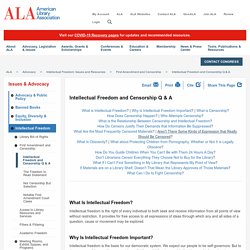
| Why is Intellectual Freedom Important? | What is Censorship? How Does Censorship Happen? | Who Attempts Censorship? Universal Declaration of Human Rights - UN. Preamble Whereas recognition of the inherent dignity and of the equal and inalienable rights of all members of the human family is the foundation of freedom, justice and peace in the world, Whereas disregard and contempt for human rights have resulted in barbarous acts which have outraged the conscience of mankind, and the advent of a world in which human beings shall enjoy freedom of speech and belief and freedom from fear and want has been proclaimed as the highest aspiration of the common people, Whereas it is essential, if man is not to be compelled to have recourse, as a last resort, to rebellion against tyranny and oppression, that human rights should be protected by the rule of law, Whereas it is essential to promote the development of friendly relations between nations, Whereas Member States have pledged themselves to achieve, in co-operation with the United Nations, the promotion of universal respect for and observance of human rights and fundamental freedoms, Article 1.
Article 2. The First Amendment in Schools - NCAC. The First Amendment in Schools How does the First Amendment protect students and teachers in schools?
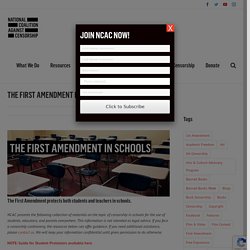
NCAC presents the following collection of materials on the topic of censorship in schools for the use of students, educators, and parents everywhere. This information is not intended as legal advice. If you are embroiled in a censorship controversy, we hope you will consult the resources below for guidance — if you need additional assistance, please contact us. NOTE: Guide for Student Protesters available here Table of Contents Introduction: Free Speech, Public Education, and Democracy The First Amendment and Public Schools A. Censorship A. How Big a Problem Is Censorship? Roles and Responsibilities A. Library Bill of Rights - ALA. The American Library Association affirms that all libraries are forums for information and ideas, and that the following basic policies should guide their services.
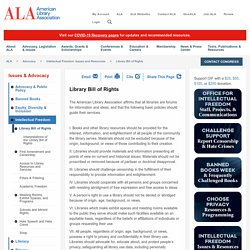
I. Books and other library resources should be provided for the interest, information, and enlightenment of all people of the community the library serves. Materials should not be excluded because of the origin, background, or views of those contributing to their creation. II. Libraries should provide materials and information presenting all points of view on current and historical issues. III. IV. V. VI. VII. Adopted June 19, 1939, by the ALA Council; amended October 14, 1944; June 18, 1948; February 2, 1961; June 27, 1967; January 23, 1980; January 29, 2019. Internet Manifesto (2014) - IFLA. 1.
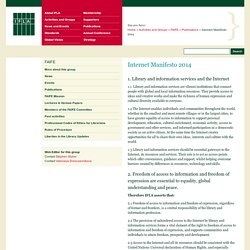
Library and information services and the Internet 1.1 Library and information services are vibrant institutions that connect people with global and local information resources. They provide access to ideas and creative works and make the richness of human expression and cultural diversity available to everyone. 1.2 The Internet enables individuals and communities throughout the world, whether in the smallest and most remote villages or in the largest cities, to have greater equality of access to information to support personal development, education, cultural enrichment, economic activity, access to government and other services, and informed participation in a democratic society as an active citizen. At the same time the Internet creates opportunities for all to share their own ideas, interests and culture with the world. 1.3 Library and information services should be essential gateways to the Internet, its resources and services. 2. Therefore IFLA asserts that: 3. 4. Download English.
The Freedom to Read - ALA. The freedom to read is essential to our democracy.
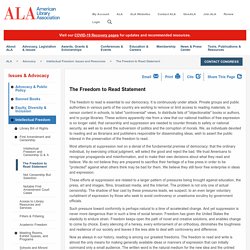
It is continuously under attack. Private groups and public authorities in various parts of the country are working to remove or limit access to reading materials, to censor content in schools, to label "controversial" views, to distribute lists of "objectionable" books or authors, and to purge libraries. These actions apparently rise from a view that our national tradition of free expression is no longer valid; that censorship and suppression are needed to counter threats to safety or national security, as well as to avoid the subversion of politics and the corruption of morals.
Children's Internet Protection Act (CIPA) The Children's Internet Protection Act (CIPA) was enacted by Congress in 2000 to address concerns about children's access to obscene or harmful content over the Internet.
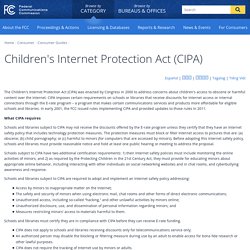
CIPA imposes certain requirements on schools or libraries that receive discounts for Internet access or internal connections through the E-rate program – a program that makes certain communications services and products more affordable for eligible schools and libraries. In early 2001, the FCC issued rules implementing CIPA and provided updates to those rules in 2011.
What CIPA requires Schools and libraries subject to CIPA may not receive the discounts offered by the E-rate program unless they certify that they have an Internet safety policy that includes technology protection measures. The protection measures must block or filter Internet access to pictures that are: (a) obscene; (b) child pornography; or (c) harmful to minors (for computers that are accessed by minors). Printable Version. Do Minors Have First Amendment Rights in Schools - Knowledge Quest. Minors' First Amendment Rights - Knowledge Quest.